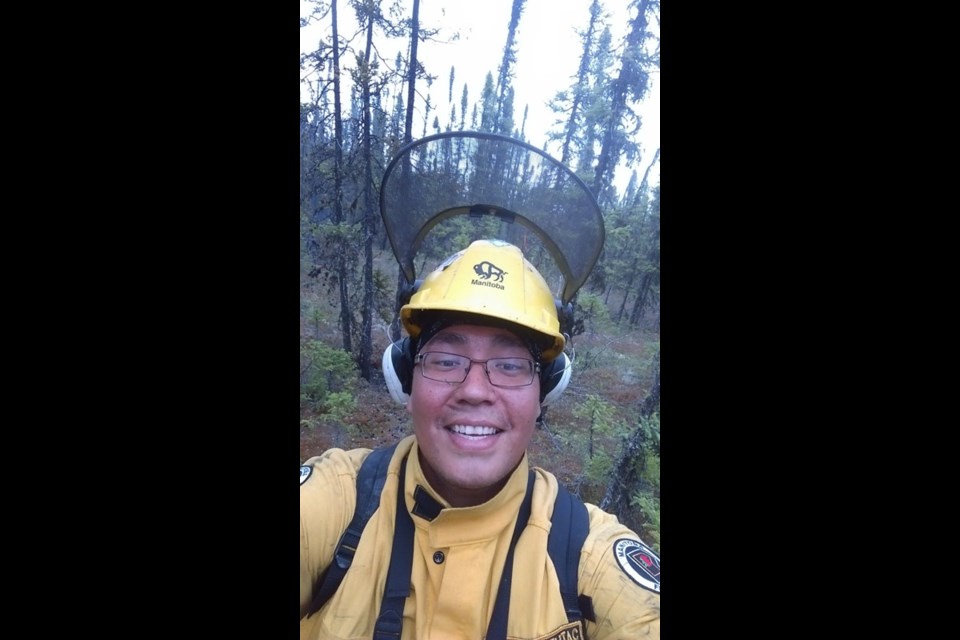The Natural Resources Management Technology (NRMT) program offered at University College of the North (UCN) in The Pas, Manitoba can, during select lecture topics, be at odds with long standing Indigenous values and beliefs toward the natural environment such as land, water, vegetation and wildlife. The NRMT Program is rooted in the scientific study of the environment, preparing the student for employment in various natural resource fields while Indigenous values of respect and care of the environment guide one’s activity on the land.
As an Indigenous person, I have been blessed with a rich heritage which provides me the opportunity to participate in spiritual and cultural practices. These spiritual and cultural practices are guided by elders and those gifted with maintaining particular ceremonies and practices.
I have also been fortunate to have been employed for four summers in the Manitoba Fire Program, initially as a fire ranger based at Grace Lake and I then progressed to gain experience as a wildland firefighter within an initial attack crew in the North East District based at Paint Lake. Varied remote experiences exposed me to the vast landscape of Northern Manitoba and efforts to suppress and minimize the impact of wildfires.
I entered the NRMT program and was immediately motivated as I made connections between my past experience and the new acquisition of knowledge and skills which challenged me at times to disconnect scientific study and their processes and the long held values within my heritage. For instance, one does not interfere with the environment without first following certain protocols which acknowledge the Creator and his gifts which, once harvested, must be cared for in a certain way with any remains properly disposed of within the natural environment.
The Indigenous worldview is holistic, the Creator is first and foremost, all that exists has spirit, and all is related. Activity is guided by respect for all creation as exercised by certain protocols or practices which demonstrate that respect. In contrast, scientific study of natural resources does not acknowledge spirituality and places emphasis on facts and data collected through studies and other research, theory and the application of certain skill sets in the pursuit of knowledge. Indigenous students for the most part must adhere to the protocols of their heritage at their own discretion, yet concern for others remains as it is Indigenous belief that when, respect is not demonstrated, harm may come to the person being disrespectful or the family of that person. Hence, the very real concern for others.
The natural environment, as a “place of learning,” will be a lasting memory. The fall and winter practicums were highlights of the NRMT program, for me personally. The practical experience of going out on the land to collect data, conducting the analysis and reporting on results is a meaningful and lasting teaching methodology, a bicultural methodology.
The knowledge and skills acquired through the NRMT Program will open many career avenues. As First Nations peoples continue to pursue self-determination, natural resource management areas will need to be mapped, the natural resources quantified, and management practices adopted to ensure sustainability. There are possible applications to economic development through tourism, harvesting and cultural exchange.
I subsequently recommend the NRMT program to all Indigenous people. The strengths of the program are a dedicated and passionate faculty and the practical approaches implemented. The student comes to appreciate the interdependence of all elements within the environment and to ensure sustainability. While responsible stewardship is a societal and personal responsibility, each graduate of the program increases the potential of lasting stewardship of the environment. The prospect of sustainable environmental stewardship supports the Indigenous worldview.
As Northern Manitoba is being reshaped by unimaginable forces on environment and culture, pitting marginalized Indigenous residents against increasingly degraded wild spaces and life, my wildlife instructor Jeffray Stepaniuk states, “We simply have to arrive at a situation where Indigenous students and graduates play a strategically prominent participatory role.” As a graduate of the NRMT program and a member of the York Factory First Nation, who has now experienced bicultural participatory learning through non-conventional wildlife and fisheries philosophies, I authentically invite all future experience developing my ability to share insight and make real progress.
I will walk away from this experience secure in my ability to adhere to my Indigenous heritage while adapting the new learning from the NRMT program in my continued journey. I want to conclude by expressing my sincere gratitude to the faculty and students for their dedication and support. Kinanaskomitinawow!




